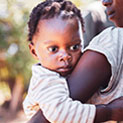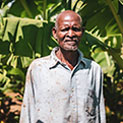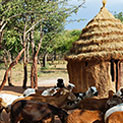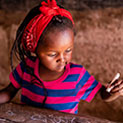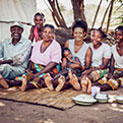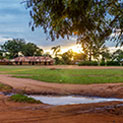- [email protected]
- Mon - Fri: 08.00 am - 05:00
It was a passion and a burden for the less privileged children at the Orphanage that spurred the heart of our pioneering director and when he shared with few friends, they were motivated and it was decided that all major religious festivities and national holidays would be used to do some special for these kids and it was christened Beulah Project. This was sometimes in 2004 and officially inaugurated on October 1st 2004.
By 2005, we included Children Parties to our activities as a means of recreational development; organized children parties for the orphans and vulnerable children and for the general children population such as Easter Children Cantata, Sallah Children Party, Christmas Children Carnival, Independence Day Celebration and May Children Day which were held in any open space even Hotels. As that year runs to the end, there became an obvious need for an open space to use as a playground and by April 2006, we acquired plots of land that we presently called land Goshen Development Centre to serve as an administrative nerve and for recreational development purposes. Not too long after, we started organizing Scrabbles and Table Tennis Championship for Secondary School Students. At the turn of 2006, our vision was enlarged to reach out to Orphans and Vulnerable Children and women in the rural communities. To maximize this, there was a name changed as this was also a pre-requisite for Corporate Affairs Commission registration. By Sept 27th 2007, we were officially registered as Life Helpers Initiative as a not for profit, non-governmental organization with focus on Education, Health, Social and Community development. Our motto was and remains, ‘Putting A Smile On A Face’.
Our Program Focus
Life Helpers has a very robust program focus, which in the time pass and even currently, different interventions have been implemented in different locations where we have our offices. The areas are
Health:
Activity strategies we carry out include Advocacy, Awareness, House to House visits, Capacity building, Health Outreaches. Areas of focus are
Maternal Newborn Child Health – focuses on issues that relates to Pre, Ante & Post natal, Immunization, other related issues on the health of a mother and her child
Nutrition – focuses on Nutrition Education & Counseling for women, children& households; Infant Young Child Feeding [IYCF] especially identifying malnourished children through use of MUAC Tape, linkages, referrals and follow-up for CMAM, Promotion of micronutrients and Tom-brown; Food Demonstration & Home/Micro Gardening Promotion; Food Distribution
Water, Sanitation & Hygiene [WASH] – Personal, Household & Environment Hygiene through handwashing education and use of soaps/ash; Promotion of Tippy Tap in communities and schools; water usage, storage and purification; Promotion of lowcost toilets (SANPLAT) for households and public places; waste related issues management; WASH Committees establishment, mentoring & supports, Water point repairs & maintenance using ,
HIV/AIDS & TB – HIV Testing Services, Support Group Formation & mentoring, Adherence & Home Support visits, Referral & Linkages
Malaria – Prevention Awareness, Promotion of Long Lasting Insecticidal Mosquito Nets, Facility based treatment
Education:
Activity strategies include Advocacy, Community Mobilization, Capacity building, Linkages and referrals. Some key areas of interest are as follows
Access to Basic Education – Enrolment, retention & transition of children especially the girl child; supporting learning outcomes; establishment of in and out of groups girls based groups or clubs
Education Support Services – covers support systems such as Adolescent Girls groups, Kids Forum, Safe Space, etc and other sporting related programs such as Quiz, Table Tennis, Spelling Bees
Educational Governance – establishment, strengthening and mentoring of School/Center Based Management Committees [SBMC/CBMC], Mothers Associations, Women Groups, Education Unit of Ward Development Committees towards school infrastructure development, increased learning outcomes while working closely with State Universal Education Boards [SUBEB] and State Agency for Mass Education [SAME]
Livelihood/Socio-economic developments:
Activity strategy grouped as follows
Vocational/Technical Skill Training – Transfer of direct skills to beneficiaries through staffs or use of master craftsmen in various selected skills which are relevant and related to the beneficiaries at a given community
Group Savings & Loan Association – supporting livelihood through group formation, training and mentoring of savings and loan association either using the traditional VSLA methodology or the SILC [Savings & Internal Lending Community]
Cash Transfer Program/Seed Grant – modeling both piecemeal and lump sum to beneficiaries using modulated, conditional or unconditional methods in the various communities. Direct disbursement as well as through microfinance institution in order to promote greater financial inclusion for beneficiaries through smart grant; provision of seed grants either in cash or an in-kind material supports as start-up for small capital trade and businesses initiatives on an individual or group based
Business/Financial Education Counseling & Training- Using documented manuals, international approved modules such as Start & Improve Your Business, Enterprise Your Household, Market Identification Opportunities among a few. We will provide for youths, women and others information that can help them develop their trade, business as well as develop fundable business plans to access soft loans or grants from government and other private agencies. We have experience in linkages with existing government.
Governance/Gender:
Activity strategies are
Basic participation for marginalized groups – identifying, selecting, training and supporting women, youths and people with special needs to be involved in local and political governance
Governance Education and counseling – Continuous Voters Registration, Party Politicking, campaign management etc in support of marginalized groups
High-level Advocacy & Engagement – Negotiation, dialogue with state government actors, political actors
Gender Based Issue – Child Protection issues includes Identification of abused and vulnerable children using the national standards and protocols, community and household education on Child Protection and setting up of Community Child Protection Committees; Family tracing and reunion; Psychosocial and access to justice; prevention, response and support as well as access to justice for marginalized, violated and abuses; providing gender based counselling and other supports
Agriculture:
Activity strategy for implementing include
Agricultural Education – sharing of knowledge and information on correct planting spacing, correct use of fertilizer, use of inoculants, information and knowledge about post-harvest and storage techniques especially use of PICS Bag as well as input distribution. This will be done either on one on one or on group basis using the nomenclature of Farmers or Producers Group and use of Demonstration Farm
Animal/Poultry Promotion – Focuses on small ruminants production looking at animal feeding and nutrition, health and housing. Poultry keeping either layers or broilers
Marketing Linkages – Building the capacity of small holders farmers on produce marketing as well as Identifying of local market to enhance profitability and increased production
Life Helpers Initiative recognises the need to leverage on knowledge, capacity and resources in order to achieve its objectives as an organisation, develop capacity of its workforce and also bring the maximal impact to the various communities of interest. LHI has been privileged to work with a few government ministries and agencies, international and national partners over these years.
Touching Lives; Transforming Families; Impacting Communities
LHI works extensively to support people in the rural communities and the urban poor in the core northern Nigeria . Our core target categor
Reach Us

- Headquarters: Goshen Development Center Tamaje Area Eastern Byepass Road Sokoto
- Adamawa: House 7, Jos Street Off Capital School Damsawo Jimeta.
- Bauchi/Gombe:Suite 51 Ibrosulada Plaza Opposite Keystone Bank, Bank Road, Bauchi.
- Kebbi: House 5, Maikada Street, Opp Bello S Yaki House Gesse Phase Birnin-Kebbi
- Zamfara: 2nd Floor A.S Mamuda Apartment Opposite Oando Filling station Gusau.
- Borno: House 12, Gidan Giwa, Sale Kida Street, Close to ICRC, Off Damboa Road, Maiduguri.
- Yobe: House No 157, Usman Adamu Kabarma Street Sabon Fegi, Behind Classi Hotel Damaturu
- Ebonyi:Plot 2, Federal Housing Estate, Judges quarters,opposite Isadore Inn, Abakaliki
- Plateau Office No 28a Tafawa Balewa Street,opposite United Baptist Church, Jos
- Abuja (FCT) Office lock C, Flat 3. Tail Solarin Crescent Oppositee Zenith Bank. 5th Avenue Gwarimpa.
Our Mission
“To Be A Leading Non- Organization, Working To Maximize All Opportunities to Empower The Marginalized People”
SUBSCRIBE
Subscribe to our Newsletter
- LHI Nigeria- Copyright 2023


